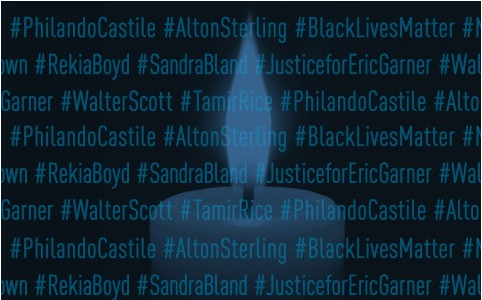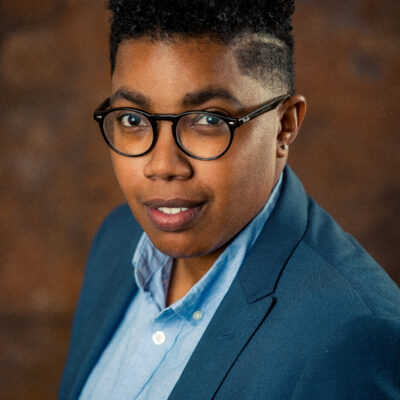The first weeks of July 2016 have been exhausting, depressing, and senseless. On Tuesday, we watched #AltonSterling become another hashtag. But before we even had a chance to properly mourn him, on Wednesday footage of #PhilandoCastile’s killing had surfaced. Two graphic videos of Black men needlessly dying at the hands of police officers reignited a discussion about what it means to be Black in America.
As communities all across the country took to the streets to make sure that discussion was taken seriously, Texas was thrust into the center of the debate. On Thursday, five police officers were gunned down in Dallas while protecting community members exercising their right to protest peacefully.
The body count has risen to eight now with #AlvaBraziel, who was shot ten times by Houston police officers early Saturday morning. While questions remain about Braziel’s final moments, we know that Alton Sterling and Philando Castile—whose deaths people filled the streets of Dallas to protest—did nothing to warrant their deaths. The five Dallas police officers did nothing to warrant their deaths. Add to that the more than 50 officers killed in the line of duty and the 121 Black people killed by law enforcement earlier this year, and it’s clear that the violence is escalating.
When we cut through the noise, commentary, and opinions there’s one question that should be on every American’s mind: What can I do to help? There isn’t one clear answer to the question. Trying to fix a system that has always been an imperfect work in progress will be challenging, to say the least. We at the ACLU are willing to do the work. If you’re willing to help, here are some concrete actions we believe will bring about change:
1. Learn your rights, know your reality
You have rights when being stopped by police, when you’re filming police, and when you’re protesting. We recognize that asserting your rights will not guarantee a good police encounter. Nevertheless, it’s imperative you be prepared and know your rights.
2. Film everything, post your videos
The violence is not new; the cameras are. If you see a police encounter happening around you, film it. Remember to stay a safe distance away and do not interfere or intervene. If you feel like you’ve captured something worth sharing, upload it publicly (YouTube or Facebook), and share the link with [email protected].
3. Tell us about unjust encounters you’ve had with the justice system
Have you been a victim of racially biased policing? Have you been issued tickets you’re unable to afford? Have you had money or property taken by police? We want to know about those encounters. Our legal team may be able to help you.
4. Join our policy team to change the law
Texas lawmakers need to talk to concerned citizens. That might mean going to your local city council meeting to testify, visiting an elected official at his/her office, or writing a letter about your personal experience. Here are examples of policy changes you can work on:
- New police trainings. Last year the Police Executive Research Forum determined that on average, officers receive 58 hours of weapons training, 49 hours of defensive tactical training, and only eight hours of de- escalation training. Our law enforcement officers need to spend at least as much time learning how to talk to people as they do learning how to shoot them.
- Revision of use-of-force policies. Tell your local police department to make the preservation of human life the prime directive for their use of force policy.
- Data collection. Law enforcement officers should collect race information for every stop they make. Only then will we be able to understand the true scope of racial profiling and correct it. Departments should likewise collect and make available all information regarding use of force incidents.
- Civilian oversight. While many Texas cities do have civilian review boards, they are mostly toothless entities that can only make recommendations to the departments they serve. In order to ensure transparency and fairness, we must see to it that no law enforcement agency is ever given the responsibility of investigating itself.
- End policing for profit. Take away incentives to target citizens that have nothing to do with public safety. This creates unnecessary and acrimonious confrontations between law enforcement and communities of color; traffic stops should be about traffic safety, and not about revenue.
- End the criminalization of poverty. In jurisdictions throughout Texas, exorbitant fines, fees, and charges can cost people their jobs, their families, and their liberty.
- End the criminalization of mental illness. The largest mental health facility in the state of Texas is the Harris County Jail. We shouldn’t be locking up the mentally ill, we should be healing them.
- End the criminalization of children. We need to raise the age of criminal responsibility in Texas from 17 to 18. We also need to ensure police officers in our schools aren’t expected to enforce everyday discipline, before another 12 year-old girl is body-slammed to the ground by a fully grown man.
- End mass incarceration. Texas imprisons more of its people than any other state in the country. And in Texas as elsewhere, those incarceration rates disproportionately affect people of color. For example, in spite of nearly identical rates of marijuana consumption, Black Texans are anywhere between 4 and 34 times more likely to face arrest and jail.
- End police collaboration with immigration enforcement. Immigration and Customs Enforcement (ICE) rely heavily on local cops to do their jobs for them. The result is that communities where undocumented Texans reside are terrified to call the police for anything. Ending local collaboration with federal immigration authorities would vastly improve public safety.
5. Demand an end the culture of warrior policing
Right now there’s a bill in Congress, the Preventing Tragedies Between Police and Communities Act of 2016, that aims to change policing practices to be about safety and police accountability. Add your name today to tell Congress to pass this bill – and transform policing in America.
6. Ask for deliberate and substantive dialogue
Call on the mayors of Texas cities to meet this crisis head on: Bring together the heads of law enforcement agencies committed to protect and serve, the leaders of organizations who fight for equality and justice, and local activists who work daily to defend vulnerable communities across this state.
Remember the words of Dr. Martin Luther King: “Violence is impractical because it is a descending spiral ending in destruction for all.” We must work together to ensure the senseless violence the nation witnessed last week—and over the past few years—is met with reason, honest reflection and action. Do not wait a moment longer to start this journey.


